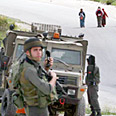

After a day of calm between security forces and settlers on Monday, police and soldiers are preparing themselves for the possibility of removing people forcibly from the former West Bank settlement of Homesh, which was evacuated during disengagement 2005.
Right-wing activists slashed the tires of three Border Guard jeeps on Monday night in the evacuated settlement. A number of settlers also climbed on a military ambulance stationed in the area.
IDF said that they viewed the incident as extremely severe and condemned any damage caused to the property of security forces guarding the activists and settlers. A complaint was filed to the police against the suspects.
If the activists fail to leave Homesh on Tuesday, the police will start evacuating them in the afternoon. Since Monday evening, the IDF prevented additional activists from entering the area.
Beginning Monday morning, thousands of right-wing activists arrived in Homesh, in a bid to rebuild the settlement. In an effort to prevent violent clashes, the IDF allowed people to arrive on foot, and even spend the night.
Only a few hundreds rightists remained in the former settlement after nightfall Monday night, most of them teens.
The army announced it will not allow marchers to rebuild the settlement. Throughout the day, cars were kept away from the area, in order to prevent the transportation of building supplies.
Regional IDF commanders decided, following a Monday night situational analysis, that if things remain calm and presence in the area appears to be temporary, then the army will not get involved and allow settlers to remain in the area until Wednesday.
If, on the other hand, the IDF suspects that individuals are attempting to build permanent structures, eviction will begin at once.
A more turbulent Tuesday
The marchers on Homesh held a rally there on Monday evening, with speeches by rabbis and right-wing activists. The 'Seven Blessings' were also said over a recently-married couple.
Hundreds of marchers left after the rally. The remaining individuals settled down, armed with tents and sleeping bags to ward of the cold, since there are no longer power lines running to the former settlement.
Binyamin Regional Council Head Pinchas Wallerstein summed up the day as "a great success. There's no doubt that the IDF's authorization to allow people to arrive in Homesh neutralized most of the tension."
Wallerstein praised the IDF and police forces for allowing a large sector of the public the freedom of expression and said he hoped that this tolerance would continue in the future. "God willing, this future will bring the resettlement of Homesh and other uprooted settlements," he said.
Despite Monday's calm, Tuesday is expected to be more turbulent, due in large part to the army's intended response to a vision such as Wallerstein's.
Additionally, organizers of the march are already incensed, claiming that the IDF was blocking supplies of food and water to the area.
"The government who brought supplies to the Muqata and the terrorists in Ramallah is cruel to the pioneers of the nation who are fighting against an evil leadership," rabbis from the Yesha regional council said.
Events are set to begin Tuesday morning when the son of Limor Har-Melech, whose husband was killed by a Palestinian shooting attack, will undergo brit-millah.















